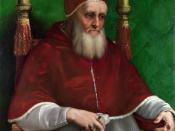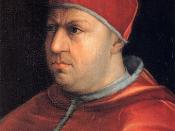Niccolo Machiavelli offers his constructive thoughts regarding numerous complex issues within his book "The Prince". Exiled when Pope Julius II defeated the French and took over Florence, Machiavelli did not have faith in the church. He saw the corruption in the Church as a self-destructing weakness and was not convinced of the Church's virtue. Machiavelli's animosity against the Catholic Church, along with his desire to be reinstated to public service, is what prompted him to write "The Prince" and urge the Medici Family to reunite Italy.
Machiavelli avowed that if Prince Lorenzo was well-received by the people that he needed no fortresses, for even in defeat, the people will stand by him. "The question may be discussed thus: a prince who fears his own people more than foreigners ought to build fortresses, but he who has a greater fear of foreigners than his own people ought to do without them" (Page 108).
Furthermore, if the people are happy during Prince Lorenzo's reign, then there is no need for them to turn to religion for it is usually the promise of salvation and freedom that attracts people to God.
Throughout the chapters, Machiavelli stops short of condemning the church and the pope as dysfunctional and irrelevant. His stance towards Christianity, however, is not as clear-cut. In chapter six, the mention of Moses along with Cyrus, Romulus, and Thesus in the same sentence could mean that he either intentionally included Moses on a superficial level to show the Church that he appears to consider Moses an outstanding person who conquered on religious bases or because he does not see Moses as one who is divinely endowed with God's will and power but rather, is just a virtuous man just like the other three men. "And although one should not speak of Moses,


